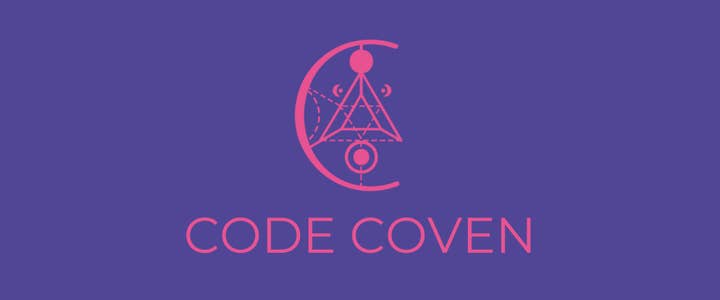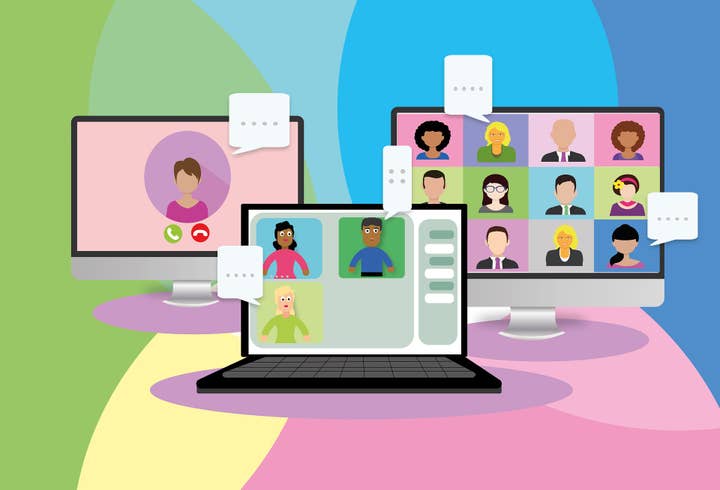Tips for intentional and healthy networking | GDC 2022
Code Coven detailed how to build, nurture and maintain good professional relationships
Building connections in the games industry will come naturally to some people but for a majority of newcomers, networking isn't an easy task.
The GamesIndustry.biz Academy previously published a guide about what to do (and not to do) when networking and building your contact book, but there's always more you can learn about the topic.
At GDC 2022, Code Coven's head of curriculum Francesca Carletto-Leon and program instructor Sherveen Uduwana gave constructive guidance in a talk called 'Accessible and Practical Networking Advice'.
Code Coven is an accelerator targeting people from marginalised backgrounds who are hoping to build a career in the games industry. The organisation offers various initiatives, such as mentorships, summer programs, online classrooms, and more.
"A really important part of what we do is we help our alumni gain communities, through remote networking," said Carletto-Leon during the GDC talk. "So today we're going to be sharing some of that advice."
"A really important part of what we do is we help our alumni gain communities, through remote networking"Francesca Carletto-Leon
As part of their introduction, Carletto-Leon said that their definition of the word 'networking' might be a bit different from the original definition.
"This term is often used to refer to more of a traditional transactional business relationship, but we also often use it to talk about the building of friendly connections through workplace contexts," she explained. "For the purposes of this talk, we'll mostly be talking about the latter.
"Our definition of networking is awareness, respect and connection to individuals who share a professional space with you, and how you can mutually contribute to each other's success and well-being through that interaction."
The talk focused on how to build, nurture and maintain good professional relationships, with Uduwana adding that networking also includes more than just the interaction.
"It's also about having an awareness of who is in your community, and figure out who's aligned with your values. Just that knowledge and understanding is really going to allow you to make genuine professional connections as you're navigating the industry."

Three golden rules of networking
Throughout the talk, Carletto-Leon and Uduwana touched upon some key principles to follow when networking:
- Professional courtesy and kindness: "Networking spaces, and communities, really only work if we are valuing the other people within them and the things that they're bringing to the table," said Carletto-Leon.
- Acknowledge the existence of power dynamics: "Every participant has things to offer. We can always grow and learn from each other at any stage in our career. If you're in a position of power and authority, you're in a really great position to uplift and empower others. So, please be using this to better your communities," Carletto-Leon added.
- Acknowledge boundaries between the professional and personal spheres: "With the games industry it's really easy to see all of our cool peers and really want to be their friends. But it's very important to acknowledge that there is a separation between the personal and professional spaces. It can't be a one-sided decision to move from a professional relationship to a [personal one]. Talking about these things is ultimately helpful in your interactions," said Uduwana.
The importance of intentionality
An important part of the talk was dedicated to what Carletto-Leon considered their "biggest takeaway from years and years of networking," which is intentionality.
"A lot of the initial advice we get in games is that 'do everything' mentality," Uduwana said. "Go to every conference, do every game jam, apply for every job. And that really ignores the reality of how, as individuals, we have really different amounts of social energy, time, money. And we also don't want to spend all that time on our careers, we have other things that are valuable to us.
"So it's really important to be intentional about how we're allocating our personal resources, so that we can invest in people, in communities that are aligned with us. To be intentional ultimately is a process of learning to understand ourselves."
"A lot of the initial advice we get in games is that 'do everything' mentality. That ignores the reality of how we have different amounts of social energy, time, money"Sherveen Uduwana
He added that there's two components to intentionality when networking:
- What you have to share and how much you have of it
- What you want and how much of it do you need
"There needs to be a balance between both of those things," he continued. "It's really important to understand that we often think of networking as a transactional thing, we're often focusing on 'What am I getting out of it?' But it feels good to share. It's just a really positive part of networking. We all have things we can do that no one else can. And the balance goes both ways. Don't forget to actually ask for what you need. So it's not just sharing but also asking people what you want.
"It's really important to think of balance as more of an ebb and flow than this static consistency. It's less about thinking of a one-to-one trade every single time. Every relationship, including professional ones, tend to have inherent imbalances. And that's also really only true when you are focusing on what networking will lead to, instead of looking at the interaction itself. We can get a lot more out of networking if we focus on the present interaction and not the outcome.
"It's really common to think of networking as this interaction that leads you to getting a gift or a reward down the line. But in reality, the interaction itself is really the gift and any outcomes or gains are a bow on top. It's really wonderful but it's not required, and we don't expect it."
The specificities of remote networking
Remote networking can be very different from in-person meetings. It presents a few challenges, but also has some advantages, as mentioned by Carletto-Leon:
- Gives you tools to maintain boundaries (muting, blocking, creating private spaces)
- More accessible
- Can require fewer resources (emotional energy)
- Small, more frequent interactions
"But sometimes the flip side of this is that we are inundated with the number of people who exist within online spaces," Carletto-Leon added. "Take Discord or Twitter for example, and we can sometimes struggle to maintain these deeper, more personal connections with the people that we care about."
But intentionality in remote spaces otherwise looks fairly similar to what it looks like in real life: just take the time to understand what you have to share, what you want, and whether you're in the right place to do either.
"It's really common to think of networking as this interaction that leads you to getting a reward down the line. But in reality, the interaction itself is the gift and any gains are a bow on top"Sherveen Uduwana
"When we talk about online remote networking and that maybe feeling scary for certain people, I think that's often because we are less familiar with how to be intentional online," Uduwana said. "Networking, in general, suffers when you're being passive and not thinking about what you want to get out of things, what you have to share. Many social spaces online are designed around being a passive member of this space.
"So when we talk about intentionality online, the internet's huge, it's overwhelming and it's super important to be thinking about the interactions you want to have before you log on. It's also important to understand that so much of what we perceive and see online is driven by algorithms, and so they inherently try to take a lot of our intention away from us and try to predict what we want."
Uduwana added that one way he circumvents that is by regularly making lists of a few people in his community or network, and specifically check up on them, and see if there's anything he can speak to or interact with, "as opposed to waiting for that to show up on [his] feed."
"In general, being an active participant, saying: maybe I'm going to find a Discord server that I haven't looked at for a while, or I'll go post on Slack -- those are all little things you can do to be more intentional, and those little things do count, even something that's just liking a post, responding to a tweet. Every interaction can be [meaningful] and it's also just as important, when you're talking about intentionality, to figure out the ways that you don't want to engage.
"If you don't feel up to going and doing a whole Twitter thread and interacting with a lot of people on one day, it's okay to do something small, because that's also being intentional. As well as having days where you don't engage with social media at all, because it's important to set those boundaries and take care of yourself in this whole process."
Expectations and how to understand them
Another piece of advice from the speakers was encouraging people to think about the spaces they're interacting within and how your expectations align with what that space offers. It goes back to that idea of being intentional in the way you network rather than going in without plan or purpose.

"It's really important to understand the social spaces that we're existing within," Carletto-Leon said. "So what type of social space are we interacting within, what are the expectations of that space? Then we can see if our needs and the things that we want to actually contribute and give to that space are aligned with the purposes of the space.
"As part of this, we should really understand: who is running this space? What are the origins of this space? And for what purpose? Also thinking about how we, as individuals, affect that space, how can we contribute to upholding its values? How could we seek to give our knowledge, our time and other resources to improve it for other people?
"The purpose of every space is going to be a little bit different. The things that people are going to be offering and receiving in those spaces are also very different. So spend some time just thinking about that, what you want to get out of your interactions, what you have to offer, and if it's aligned with the purposes of that space."
Maintaining connections
When maintaining connections, Carletto-Leon advised to be intentional about the people that have shown you support in the past, for instance.
"Think about someone who's made a meaningful impact in your life and your career, and reach out to them directly to say thank you," she said.
Uduwana added that, when talking about this idea of maintaining connections, it's important to acknowledge that what we imagine networking is isn't really aligned with what networking actually looks like on a daily basis.
"I think it's really common to see people imagine a networking encounter as 'I go to a conference, I see someone and I interact with them, I give them a business card and then we get a follow-up email'. 90% of networking interactions are completely different from what that looks like.

"It's really just any interaction that allows you to meaningfully represent yourself as a professional within your professional space, so that includes things like just interacting on social media, talking to folks at work, job applications.
"There have been absolutely times where I applied for a job and I haven't gotten the job but I suppose maybe made a positive impression because years later when I needed a signal boost or something, people who interviewed me for jobs commented on it or signal boosted it and said, 'Oh, Sherveen is lovely, you should check this out'. And that's really impactful in a way that you're not always going to be thinking about.
"I think in general this idea of maintaining an online presence is really really helpful in terms of networking, and even if it's just taking an online class, that's an amazing way to network. You're ensuring that you are getting to interact with a group of peers that, at the very least, have some base level interest in something that you might be passionate about, whatever the subject of the class."
The final networking strategy offered by the speakers, and a good way to maintain relations, was a simple one: just make cool stuff. Creating weird, interesting projects, whether that's games or something else, can be a conversation starter that will follow you for years and make you a recognisable name.
More GamesIndustry.biz Academy guides to Working in Games
Our guides to working in games cover various perspectives, from hiring to retention, to landing the job of your dream or creating the right company culture:

